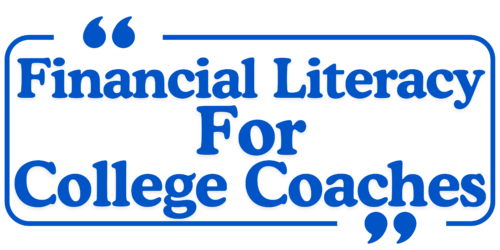Here are 50 follow-up questions that college coaches can consider to deepen their understanding of financial literacy and ensure they are effectively applying the knowledge they’ve gained:
General Financial Literacy
- What specific financial goals do I want to achieve this year?
- How often should I review my budget and make adjustments?
- What expenses can I cut back on to increase my savings?
Income Management
- What factors should I consider when negotiating my contract?
- How can I ensure that my performance bonuses are structured effectively?
- What are the implications of signing a multi-year contract?
Retirement Planning
- How much should I be contributing to my retirement account each month?
- What retirement plan options are available for coaches at my institution?
- When should I start thinking about my retirement lifestyle?
Investment Strategies
- What are the different types of investment accounts I should consider?
- How can I evaluate the performance of my investments?
- What resources are available to help me learn about investing?
Tax Literacy
- What are the tax implications of my coaching income?
- How can I optimize my tax deductions?
- When is the best time to consult a tax professional?
Credit Management
- How often should I check my credit report for accuracy?
- What steps can I take to improve my credit score?
- How does my credit score impact my ability to secure loans?
Insurance Literacy
- What types of insurance should I consider beyond health and auto?
- How do I assess whether I have adequate life insurance coverage?
- What are the risks of not having disability insurance?
Estate Planning
- Have I created a will or trust, and who will serve as my executor?
- What should I consider when naming beneficiaries?
- How can I ensure my estate plan reflects my current wishes?
Transition Planning
- What financial preparations should I make for a career change?
- How can I plan for my retirement in terms of location and lifestyle?
- What resources can help me transition to a post-coaching career?
Family Financial Literacy
- How can I involve my family in our financial planning discussions?
- What age is appropriate to start teaching my children about money?
- How can we create a family budget that works for everyone?
Emergency Fund Planning
- What are the best strategies for building my emergency fund?
- How can I balance saving for an emergency fund with other financial goals?
- What unexpected expenses should I be prepared for?
NIL Considerations
- What should I know about NIL contracts before advising my student-athletes?
- How can I help my athletes maximize their NIL opportunities?
- What are the potential pitfalls of NIL agreements?
Debt Management
- How can I effectively manage any existing student loans?
- What strategies can I use to pay off high-interest debt?
- Is debt consolidation a viable option for my financial situation?
Miscellaneous Financial Skills
- What additional financial topics should I explore to enhance my knowledge?
- How can I find reputable financial education resources?
- What questions should I ask when interviewing potential financial advisors?
Planning and Strategy
- What are the key components of a solid financial action plan?
- How can I stay accountable for my financial goals?
- What should I do if I encounter unexpected financial setbacks?
Lifestyle and Spending
- What lifestyle changes can I make to improve my financial health?
- How can I prioritize my spending to align with my values?
- What are the long-term impacts of impulse purchases?
Technology and Resources
- What financial tools or apps can help me manage my budget effectively?
- How can I stay informed about financial news and updates relevant to my field?
These follow-up questions can help college coaches take actionable steps toward enhancing their financial literacy, ultimately leading to better financial management and decision-making.
